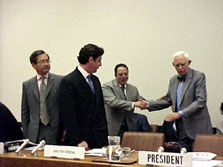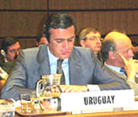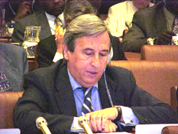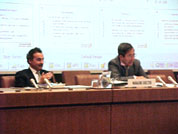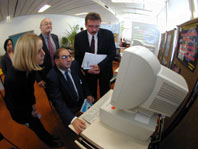Industrial Development Board, 22nd session
Daily Highlights: Vienna, 30 May 2000
"This activity of evaluating the performance of the Secretariat periodically is undoubtedly one of the main purposes of the Industrial Development Board," said Director-General Carlos Magariños welcoming participants and guests at the 22nd Session of the Industrial Development Board today. However, "in my view there is an equally important task to fulfill in these meetings. This is to engage Member States in a discussion on how to deal with the current challenges facing the Organization and how to move it positively forward."
The Board meeting is being attended by 53 Member States and high-level officials, among them the Minister of Industry, Mining and Handicrafts of Senegal, His Excellency Mr. Savané, who also represents the Presidency of the 14th Conference of African Ministers of Industry; His Excellency, the Minister of Commerce, Industry and Handicrafts of Burkina Faso, Mr. Cissé; His Excellency, the Minister of Industry and Tourism of Côte d'Ivoire, Mr. Affi N'Guessan; His Excellency, the Minister of Industrialization and Handicraft of Madagascar, Mr. Ratovomalala; and His Excellency, the Minister of Industry, Energy and Mining of Uruguay, Dr. Sergio Abreu Bonilla.
In his statement, Mr. Magariños focused on the three following issues: the financing of the integrated programmes, the process of decentralization and a portfolio of new initiatives, which were the conclusions of the last retreat of senior UNIDO staff in January 2000. Presenting an overview of the integrated programmes, he stressed that their financing was one of the most important issues, as the Secretariat has already formulated and approved 41 programmes. "This is eight more than UNIDO had at the end of 1999 and translates into a total yearly requirement for funding of US million of technical cooperation over the next five years," he explained. With regard to the process of decentralization, he said that "we developed a number of ideas and initiatives, and we are currently attempting to establish a number of Regional Offices. However, for this process it will be extremely important to count on a clear definition of the size and characteristics of the activities of technical cooperation we will carry out at the field level." Speaking about the retreat, Mr. Magariños stressed that UNIDO staff themselves proposed a number of actions to streamline even further UNIDO's services and structure.
The departing President of the Board, Ambassador Reguieg from Algeria, who was succeeded by the newly elected President Ambassador Ortiz from Spain, opened the meeting. Thanking Member States for his election Mr. Ortiz said that after his three and half years of working with UNIDO, he could see fruits of an excellent cooperation with Member States. He believed that the present session would further assist UNIDO to develop its future work. (Picture: The departing President of the Board, Ambassador Reguieg from Algeria, welcomes the newly elected President Ambassador Ortiz from Spain.)
Following the adoption of the agenda, statements were made by the representatives of Uruguay (on behalf of the Group 77 and China), Portugal (on behalf of the European Union, Bulgaria, Czech Republic, Hungary, Latvia, Malta, Norway, Poland, Romania, Slovakia, Slovenia and Turkey), Ethiopia (on behalf of the African Group), Guatemala (on behalf of GRULAC), Côte d'Ivoire, Burkina Faso, Republic of Korea, Italy, India, China, Egypt, Poland, Japan, Morocco, Croatia, Nigeria, Algeria, Belarus, Mexico, Colombia, Spain, Sri Lanka, Turkey, Bulgaria, Sudan, Pakistan and Austria. The statements mainly focused on Annual Report of the Director-General on the activities of the Organization in 1999. However, many speakers expressed their comments on other agenda items, such as the integrated programmes, their financing, and payments of arrears, are also included.
A statement of the Group of the G-77 and China, which was delivered by H.E. Ambassador F. Pittaluga-Fonseca, Chairman of the G-77 and PR of Uruguay, complemented UNIDO as "a provider of integrated technical cooperation and as a main Global Forum for acquisition and dissemination of knowledge and as partner in development." However, Mr. Pittaluga-Fonseca expressed the Group's concern about the financial situation of UNIDO and urged the Member States to express their support to the Organization by increasing their contributions to technical cooperation activities. He also invited the Secretariat to renew its efforts to mobilize funds for the implementation of the integrated programmes. The Group of 77 and China commended the Director-General for organizing the meeting on the impact assessment of the integrated programmes and looked forward to similar meetings to evaluate the implementation of the integrated programmes. (Picture: H.E. Ambassador F. Pittaluga-Fonseca, Chairman of the G-77 and PR of Uruguay)
H.E. Ambassador Rosa La from Portugal, who spoke on behalf of the European Union and the countries which associated themselves with the statement, reiterated its appreciation to the Director-General and his staff for their ongoing commitment to the process of reform of the Organization in implementing the Business Plan. "We stress the importance of industrial development in the fight against poverty. Developing countries and economies in transition need sustainable, environmentally friendly and technologically up-to-date industries. We believe that UNIDO can definitely play a role in this connection, as the UN specialized agency mandated to these matters," he said. (Picture: H.E. Ambassador Rosa La from Portugal)
Member States and guests attended a presentation on UNIDO Exchange, which aims at bridging the digital divide between industrial stakeholders in the fast lane of the information superhighway and the vast manority of those in the developing world who urgently require access to electronic business and technological opportunities. Introducting the presentation, Mr. Maruno, Deputy Director-General and Managing Director of the Investment Promotion and Institutional Capacity-Building Division, said that as a knowledge-based and technology-oriented tool, the UNIDO Exchange was in tune with UNIDO's global forum role and has been designed as a means of communicating global perspectives on the latest industrial trends in investment, technology and environment. Then he gave floor to Mr. A. Pinto Rodrigues, Manager of the Business Development Unit, who explained the features of the Exchange, that links a worldwide network of members together from finance institutions, investment promotion agencies and government bodies to technology institutes, industrial associations and business associations from varying regions and sectors with varying interests. The ongoing exhibition of UNIDO Exchange is available for the participants. (Picture: Messrs Maruno and Pinto Rodrigues during the presentation of the UNIDO Exchange)
In addition to the above presentation, the participants are offered various panel and database exhibitions. The exhibition Focus on Africa displays the results achieved under the five UNIDO integrated programmes, for Burkina Faso, Mozambique, Rwanda, Tanzania and Uganda. The exhibition shows the tangible efforts and results of the new UNIDO approach, setting a positive precedent for the evolution and continuation of the programme.The Cleaner Production Database is a source of information containing data from case studies done in developing countries and will provide for hands-on process and online calculations, thereby acting as a strong decision making tool, which will be readily available for Cleaner Production Centres in developing countries and economies in transition.
The IDENTIFY software tool helps answer two key questions: (1) to what extent can improved industrial technologies and practices reduce greenhouse gas emmissions; and (2) what other impacts (cost and non-economic benefits) result from the introduction of these technologies. UNIDO has also developed DTREE, an online, computerized decision support system for the assessment of environmental impact of biotechnology that will act as a roadmap and be use to facilitate the identification of areas of potential biosafety concern. Within the field of knowledge management the WIPNAD (Wood Industry Project Navigator Database) system has been developed as a tool for sectoral investment analysis. This will provide an access to specialized technical information on raw matarial supply, production and processing parameters, machinery and equipment.
